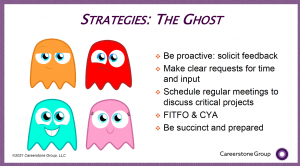What makes or breaks your job satisfaction? Pay? Coworkers? Office environment?
For many of us, the answer to that question is our bosses. And while a good boss can make our jobs enjoyable, a bad boss can make things unbearable. 75% of Americans say their boss is the worst part of their day, and bad bosses are one of the top three reasons people leave their organization.
On the recent GovLoop online training, Surviving and Thriving With Bad Bosses, Mary Abbajay, President of the Careerstone Group, LLC and author of Managing Up: How to Move Up, Win at Work, and Succeed with Any Type of Boss, shared her insights into dealing with difficult bosses.
One of the first points Abbajay made was that “human beings are complex creatures.” This means that any relationship between you and your boss is certain to be complex and nuanced—but there are strategies that you can apply to any situation that will help you create the best working relationship possible.
Before you begin to work on your relationship with your boss, you must consider what is and isn’t under your control. As much as we might like to be able to change the way our boss operates, we will not be able to change them through our actions. But we do have control over ourselves. By assessing the gap between how we work and how our boss operates, we can begin to figure out a strategy for maximum harmony.
The first step is understanding what type of boss you’re dealing with. Check out the four types of difficult bosses that Abbajay identified, and how to deal with them:
The Micromanager

The Workaholic

The Impulsive

The Ghost

There is another important type of boss to recognize—the toxic boss, the truly monstrous one who creates an unhealthy and destructive environment. Thriving in this situation may not be an option; Abbajay recommends carefully considering when it is time to quit or transfer, as the negative personal and psychological effects of staying may outweigh any potential career considerations.
The reality is that people are often promoted based on their technical skills rather than their management skills. In many organizations, especially in government, there are lots of people in management positions who don’t want to be there—but who had to take on a management role to advance in their own careers. This means that bad or difficult bosses are not uncommon—but with the right approach, you can make the best of a bad situation.
Managing up, said Abbajay, is about managing the relationship, not managing that person. Making the relationship work for us, them and the organization. The goal is figuring out adaptive relationship strategies so we can all succeed. Our bosses, good or bad, have a lot of influence over our daily lives, and by taking the right approach to the situation, we can make our working lives pleasant and frictionless.
For those out there struggling with difficult bosses, take heart. Change for the better is possible, and it can start with some simple adaptation.





Leave a Reply
You must be logged in to post a comment.